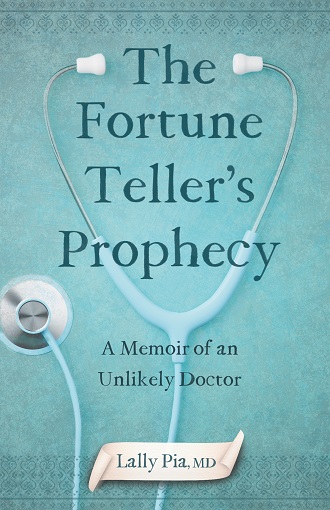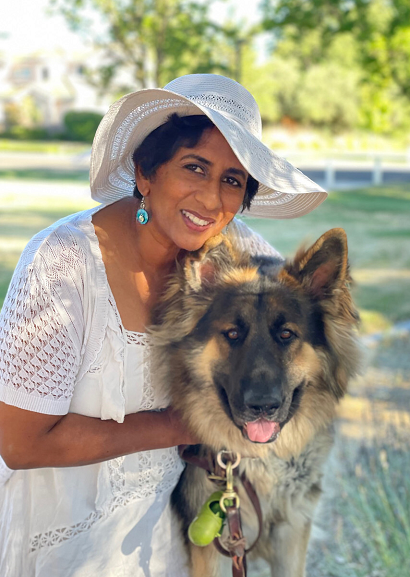I realized that to allow people to feel my emotions, I would have to let them into my world so they could be with me as I faced each mountain. The revealing of my failures and insecurities was difficult to disclose, but it got easier to let go as I progressed.
Lally Pie, MD – 30 April 2024
The Back Flap
When a military coup in Ghana leads to the abrupt closure of Lally Pia’s medical school, she is left stranded there, thousands of miles away from her family in California, with no educational prospects or money. Adding to her turmoil is her discovery that her American Green Card has been botched, which means she has no country to call home. But a Sri Lankan priest told Lally that she would one day become a “Doctor of Doctors” —and she is intent on proving him right.
This sizzling multicultural roller coaster illustrates the power of self-determination as Lally, a young immigrant with a drive to succeed, takes on obstacle after obstacle—an abusive relationship, the welfare state, and a gruesome job where she has to dismember human bodies—in order to fulfill her dreams. A story that will resonate with anyone who has faced cultural and immigration hardships, The Fortune Teller’s Prophecy is a nail-biting journey across continents, through hardships, and into ultimate triumph.
About the book
What is the book about?
This memoir relays a story of hope and a refusal to give up, despite facing multiple obstacles in three continents.
When did you start writing the book?
I conceptualized the memoir about ten years back.
How long did it take you to write it?
It took most of those ten years, but much of the time it sat on the back burner as I focused on another novel. I did most of the intense work on the memoir in the last two years.
Where did you get the idea from?
I had always trifled with the idea of relaying my story because of the unusual slants that my life took along the way. I kept a diary from age 13 till I turned 22. I always hoped the events of my (exciting) life might become fascinating to others.
Were there any parts of the book where you struggled?
Yes, the whole book is a story of struggle. I struggled with my emotions as I described my first relationship and how it broke down when I left my first husband. It was difficult to lay out how the naive young girl I once was became disillusioned and then sought to get out of the situation I found myself in. In addition, by nature I am a very private person. I currently practice psychiatry so I am very quiet about my private life. Laying out my journey for others to see was very difficult. I realized that to allow people to feel my emotions, I would have to let them into my world so they could be with me as I faced each mountain. The revealing of my failures and insecurities was difficult to disclose, but it got easier to let go as I progressed.
What came easily?
Once I gave myself permission to talk about certain chapters of my life, the words simply flowed. I then found I had to edit them down like crazy to shape them into the story I wanted to tell–––the braid I wanted to weave.
Are your characters entirely fictitious or have you borrowed from real world people you know?
My memoir has only real people in it. There is no fiction in it. In several places I have changed names to preserve confidentiality, as there are also patients listed. I have changed genders as needed to protect their privacy.
We all know how important it is for writers to read. Are there any particular authors that have influenced how you write and, if so, how have they influenced you?
Paul Kalanithi. I found his book about his facing death really fascinating, as he was also a doctor. I liked his style of writing as he was separating his clinical appreciation of what he was facing, yet trying to remain a husband and patient at the same time.
Robin Cook. I love a good thriller. I am more than halfway through completing a psychological suspense novel.
Jack London. I love his philosophy of “rather be ashes than dust”. That is also how I like to live. I so admire his love of the earth and appreciation of the beauty and wisdom within animals.
Dan Brown. I enjoy his writing style and the way he pulls you in, then leaves you hanging as he switches to a different character that is also going to play a part in the story. He is very skillful about the way he manages these different characters.
Agatha Christie. I loved how she was able to relate tales in a way that kept you guessing all the way to the end. Truly a master of keeping you in suspense.
Alistair MacLean. His descriptions of the scenes of the artic are incomparable. They draw you in and take you there.
Enid Blyton. The first and most important influence on me as a writer. I read every book I could find. Her story telling ability is fantastic.
Do you have a target reader?
Yes, many targets: immigrants facing a struggle with bureaucracy, older medical students facing the fear that they may have to give up on medical school, naive women who are considering leaving a toxic relationship, but unable to find the strength to stand up and do something about it, single females on welfare who dream of a better life, those who lack hope because they are in miserable circumstances, mental health professionals who work with those who need hope the most: our patients.
About Writing
Do you have a writing process? If so can you please describe it?
I write by the seat of my pants, unleash lots of ideas of what I want to say, then find a way to organize the plot from the material I have. Reshaping or editing of the initial material is the hardest part, but the most essential. If you want to grab your reader and keep them, I believe you have to edit the material over and over and not feel scared to “kill your darlings”. I always take a lot of time to try to hook the reader right at the beginning, and also at the end so I can leave the reader with a good “taste” in their mouth as they complete the work.
Do you outline? If so, do you do so extensively or just chapter headings and a couple of sentences?
I do not outline. I allow my brain to go where it will with material, then allow ideas to germinate from the places I end up. This frees me up to be as creative as I want during the process. Outlining tethers me and I find it constricting.
Do you edit as you go or wait until you’ve finished?
I wait till I am finished most of the time, but I do edit if I have not put down exactly what I want to say the first time.
Do you listen to music while you write? If yes, what gets the fingers tapping?
I prefer silence. However, if there is ambient noise I am easily distracted, so playing Mozart or other relaxing classical music is what I prefer. Lyrics distract me, so it has to be instrumental.
About Publishing
Did you submit your work to Agents?
Yes I submitted the manuscript to about fifteen to twenty agents, but got no requests for the manuscript.
What made you decide to go Indie, whether self-publishing or with an indie publisher? Was it a particular event or a gradual process?
A friend told me about a book competition. It was almost at the end of the submission period, so I applied and won a publication deal after submitting the first 50 pages of the memoir. My book will be published by She Writes Press on April 30, 2024. The audiobook was something I did with my husband. It was a fun, if tedious, process. It is available through multiple vendors.
Did you get your book cover professionally done or did you do it yourself?
My publishing company, She Writes Press, did everything. I simply had to approve it.
Do you have a marketing plan for the book or are you just winging it?
My publishing award came with a publicity team. I would have struggled significantly to come up with a marketing plan. I am taking a marketing course with Stephanie Chandler (I had the winning bid at a silent auction at the San Francisco Writers’ conference in 2022)
Any advice that you would like to give to other newbies considering becoming Indie authors?
Develop a thick skin. You will need it.
Believe in your work, for the belief in your craft will keep you going when the rejections pile up. But do listen to your fellow readers. If a majority do not like what you have written, pay attention to the gentle redirections! They are politely indicating that you work sucks, so it may be time to change directions. They can’t all be idiots!
Join a book club that has good people there who are better writers than you and who will give a good critique of your work. Over time, your writing will improve, and you will learn about many aspects of writing including editing and competitions, like the one that landed me my first publishing deal! Other people you meet may have been in this field longer and will be able to shepherd you and mentor you as you learn the language of writers/authors.
Attend craft discussions, surround yourself with people who love writing like you do. Writing is such a solitary process that you need the support and cushion and kick in the seat of your pants that other writers can provide.
Shy away from people who tell you to pay for anything except a competition. Let your creativity light the way.
About You
Where did you grow up?
Born in Sri Lanka, grew up in Ghana.
Where do you live now?
California.
What would you like readers to know about you?
I always see the glass half full. I enjoy helping people to feel hope, no matter how dire their circumstances.
What are you working on now?
I am working on three novel projects. One is close to completion (psychiatrist in a jail; psychological suspense), another is a mystery that involves a female mortician who encounters suspicious circumstances while working her embalming job (barely started). I’ve also cooked up the story of young girl who receives a strange letter from a relative. I’m not sure exactly where it is going, but that is where I have the most fun!
End of Interview:
For more from Lally Pia, MD, visit her website and follow her on Twitter.
Get your copy of The Fortune Teller’s Prophecy from Amazon US or Amazon UK.


